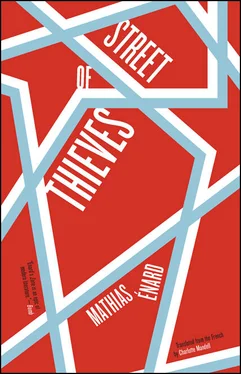I looked for news of Cruz’s death; the only thing I could find was a tiny item in the Diario Sur :
TRAGEDY IN ALGECIRAS POISONED BY ONE OF HIS EMPLOYEES
The owner of a funeral enterprise, Marcelo Cruz, was found dead at his place of work from strychnine poisoning. It was one of his neighbors and collaborators, the Imam of the Algeciras mosque, who called emergency services. The precise circumstances of the tragedy are still unknown but, according to the National Police, Mr. Cruz was poisoned by one of his employees, who fled after robbing him.
So I was being sought for murder and theft.
It wasn’t a surprise, but seeing it in the paper brought a lump to my throat. Fortunately, Cruz hadn’t told the authorities about my presence; he didn’t have a work permit for me, hadn’t photocopied my identity papers, so there was no clue, aside, no doubt, from my fingerprints and my DNA — the Imam didn’t know my last name: but he could still describe me, indicate my name was Lakhdar and that I came from Tangier. That was much more than the cops needed to recognize me in case of arrest, especially with a first name as uncommon as mine.
I thought again of Cruz’s dogs, I wondered who would take care of them. Maybe because they were the only glimmer of light in the darkness of the last weeks, I missed their mechanical tenderness, their fur and their breathing.
To keep from being arrested, I had to lay low on the Street of Thieves.
Everything seemed very far away to me.
Judit, closer than ever, seemed far away.
Tangier was far away.
Meryem was far away, Bassam was far away; Jean-François Bourrelier’s soldiers were far away; Casanova was far away; I had found a new prison for myself, Carrer Robadors, where I could hide; you never leave prison.
Life was far away.
The first days were hard — I stayed in a hotel for students, totally unthinking: I had to leave my passport at the desk, the cops could have easily found me and collected me first thing in the morning. But nothing ever happens the way it does in books. Whatever the case, well hidden in the Raval, in the lower depths, between the whores and the thieves, I felt as if I had nothing to fear.
The Tariq ibn Ziyad Mosque was in the hands of the Pakis; I also ran into a few Arabs there, but few in comparison. The Imam was from the Punjab. I spent some time there, in the beginning, in order to meet people, to rest in prayer and reading. When you have no home and know no one, you have to start somewhere: bars or mosques — and I chose well: it was thanks to the mosque that I found my room in the dilapidated but livable apartment, in the heart of the Raval fortress: thirty square meters all lengthwise, with a little balcony. I shared the apartment with a Tunisian named Mounir. I paid three hundred euros per month, everything included — in fact we didn’t know who was in charge of electricity, if there was an electric bill; as to water, it came from large reservoirs on the roof, and there were no meters. I never managed to find out who the owner was — we settled the rent in cash in a bar on Sant Ramon Street, and that was it. When Mounir couldn’t pay, at the end of April, two guys gave him a good thrashing; that encouraged him to find dough quickly, he got by, took some risks to steal four nice bicycles which he sold off cheaply, nothing else.
My relationship with Judit was strange. We saw each other almost every day. She helped me with everything; she even went so far as to open an account in a savings bank in her name so I could deposit my money — she gave me the debit card and the PIN, it was all cash of course, given where I lived. It was she herself who made the deposit for me, she didn’t ask me where the cash came from and I didn’t tell her.
Judit seemed to me the most beautiful and noblest of women, even if, for a reason that was entirely obscure, she no longer wanted me. She immediately arranged to find me work — teacher of Arabic. Twice a week, I gave a special class to Judit, Elena, and Francesc, one of their schoolmates, for ten euros an hour. I was very proud. I explained the subtleties of grammar to them; I commented on classical verses with them. Often, I learned that same morning from a book what I explained in the afternoon; all of a sudden I was reading a lot in Arabic to prepare for the classes, it was enjoyable. We learned by heart some poems by Abu Nuwas, in my opinion the greatest, most subversive, and funniest of the Arab poets; I explained to them, almost line by line, the great novels of Naguib Mahfouz or Tayeb Salih which I had never read, but which were on their class list.
Judit lived with her parents, at the top of the city, in Gràcia; it was a mostly middle-class, well-kept neighborhood, an old village attached to Barcelona in the nineteenth century, with narrow streets and pleasant squares; local tradition had it that the children of these bourgeois people were mostly rebellious and alternative: there were a lot of activist organizations, there was even a squat, right in the middle of the neighborhood — youth will have its fling. Up there, the Arabs too were more fashionable, more bourgeois; the restaurants mostly Syrian, Lebanese, or Palestinian; right next door to Judit’s home was also a Mesopotamian establishment and a Phoenician one — all that was a little intimidating and, stuck between Catalanity and Antiquity, I preferred to take refuge in the darkness of my alleyways. Judit of course felt very much at ease up there. She had her friends there, her school, the streets where she’d grown up; sometimes she insisted on taking me out to lunch, after the Arab class, in one of those noble, ancient restaurants: the owner at the Phoenician one hadn’t come straight out of a sarcophagus in Sidon, he was a Lebanese from the mountains; he talked politics with Judit for a while, about Syria, mainly, the civil war underway, the difficult role Turkey, Saudi Arabia, and Qatar would play in it — it was all a little depressing, I felt that whatever we did, the Arabs were condemned to violence and oppression. I have to admit he was pretty intelligent and very nice, that Phoenician, which only increased my jealousy — I didn’t open my mouth, he must have taken me for a grouch or a half-wit.
Judit grew more mysterious every day. She seemed sad, profoundly sad at times, absent, but I couldn’t figure out why; at other times, though, she was bubbling with energy, laughed, spoke to me of her plans, suggested we go out for a walk or a drink. The first days I bugged her to make her confess she was with someone else, but she kept denying it, I stopped persecuting her, and after a while I knew so well how she used her time that I had to face facts: there was no one else in her life, aside from a few university friends and me.
That was all the more incomprehensible.
I told myself I had to give her time, she’d end up coming back to me. Sometimes, when we went out, I’d take her hand; she wouldn’t withdraw it — I just felt as if it was all the same to her. And even, on one occasion, and only one, we slept together: I had invited her to see my glorious new room in the afternoon; she let herself be kissed and undressed without putting up any resistance — and I mean without putting up any resistance, mechanically, and all my caresses, all my love came to nothing, so much that once my business was done, she got dressed in silence, and I was overcome with shame, shame and guilt as if I had raped her. She reassured me, saying I was being ridiculous, she just didn’t want to at the time, that’s all.
“I told you, I don’t have the strength to be with someone.”
For me, it was absolutely unfathomable, it must have been some kind of illness. So I spoiled her; I wrote her poems, gave her books, reminded her of the perfect times in Tangier and Tunis. Those memories plunged her into melancholy. She seemed fragile, as if the slightest thing could make her crumble.
Читать дальше












